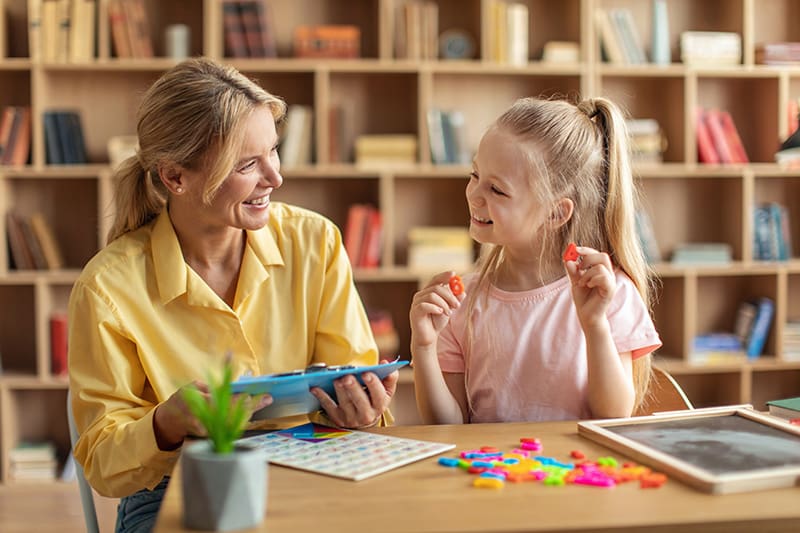Children do not begin to master language until they are 5 to 6 years old but they begin learning words and their meanings earlier than that. Parents can do a lot to ensure the progressive development of language in their child. Studies have shown that a child’s ability to learn can increase 25% or more depending on whether she or he grows up in a stimulating environment.
So how do you create a stimulating environment for your child? You may be surprised that it’s very easy and natural to do. There are many speech therapy activities that you as a parent can engage with your child to stimulate language development. Here are some age-appropriate activities:
Birth to 2 Years
The 5 Ws (and one H): Share with your child the who, what, where, why and how as you feed, dress, and bathe him/her. Here are a few examples:
- Who? Introduce animal sounds to associate a sound with a specific meaning: “The kitty says meow.”
- What? Identify colors.
- Where? Emphasize place as you walk with your baby, “Here is the kitchen, here is your bed, here is the floor.”
- Why? Maintain eye contact, respond to child’s speech, and imitate sounds. Use different vocal patterns and emphases such as raising the pitch of your voice to indicate a question.
- How many? Count items.
Coach your Child:
- Encouragement is what your baby needs in order to communicate effectively.
- Use gestures such as waving goodbye to emphasize meaning.
- Acknowledge the attempt to communicate with a verbal cue.
- Encourage your baby to make vowel-like and consonant-vowel sounds such as “ma,” “da,” and “ba.”
- Imitate your baby’s laughter and facial expressions.
- Coach your baby to imitate your actions like clapping hands and blowing kisses.
- Play rhyming, “hands-on” games such as pat-a-cake, peek-a-boo, and the itsy-bitsy spider.
Read:
- Reading to your child is very important. Studies show that children may need to hear a word 9-14 times before they actually know what it means. So read clearly and often.
- Read books that are meaningful in substance and engaging on a visual level (i.e. the bigger and more colorful the pictures, the better).
- Point to pictures and ask your child, “What’s this?” and encourage him/her to do the same.
2 to 4 Years
Baby talk vs. Adult Talk:
- By now you should be talking to your child using intelligible speech that is clear and simple for your child to model.
- Use baby talk only if needed to convey the message and joined by the proper word. “Would you like num-nums? Would you like food?”
Question:
- Pick and choose. Ask questions that require a choice. “Do you want a banana or a pear?” “Do you want to read the Dr. Seuss or Mother Goose?
- Play the yes or no game. “Are you a girl?” “Are you Samantha?” “ Do whales have polka-dots?” “Can elephants fly?” Encourage your child to make up silly questions too.
- Indicate that you understand what your child said by repeating him/her. Build and expand on what she said. “Want ice cream? I have vanilla ice cream. Do you want vanilla ice cream?”
Play games:
- Cut out pictures of different things and group them into categories, such as animals, things to wear, things to ride on, things to eat, etc.
- Mix and match pictures. Glue a picture of a pig flying a plane and talk about what is wrong with the picture and ways to “fix” it.
- Present nursery rhymes, songs, and poetry so your child can learn about the facets of oral language. Rhymes encourage children to explore how sound works in language.
Read:
- Read books clearly and often.
- The brain grows best in a nurturing and safe environment. What better way to create a safe and nurturing environment than sitting closely together at home reading a book?
4 to 6 Years
Stop, Look, and Listen:
- When your child starts a conversation, give your full attention whenever possible. So stop, and give them eye contact and listen to what he or she is saying.
- Stop: Pause after speaking. Give your child an opportunity to continue the conversation.
- Look: Make sure you have your child’s attention before you speak. Make eye contact.
- Listen: Recognize and encourage all attempts to speak. Show that you understand the word or phrase by fulfilling the request, if appropriate.
Directions:
- Describe spatial relationships: up, down; first, middle, last; on and off.
- Encourage your child to give directions. Follow his/her directions to playing a game.
- Help your child follow two and three-step directions: “Go to the closet and bring me the umbrella.”
Games:
- One of these things doesn’t belong: Name a number of items and have your child determine which one doesn’t belong such as elephant, lion, monkey, giraffe, computer.
- I spy with my little eye: Give clues as to what you are describing. “We use it to clean the dishes. It is loud and washes plates (dishwasher). “It feels soft and barks loudly” (dog).
- Story time: Have your child describe his/her favorite story to you or what happened when you went on vacation.












